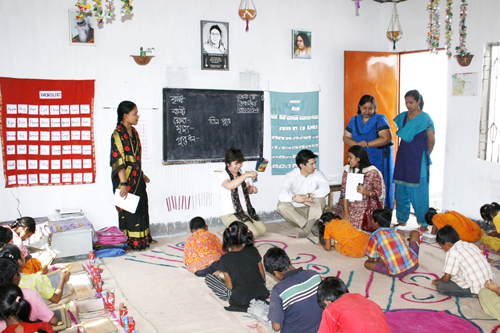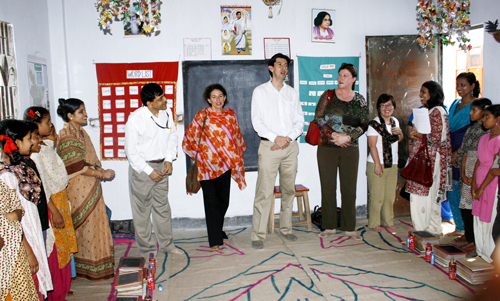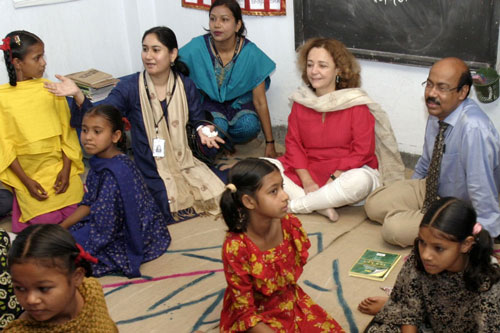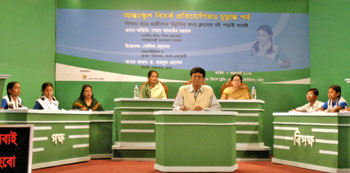
News (826)
Netherlands support for Institute OF Educational Development of BRAC University

24 March 2009, Dhaka. The Embassy of the Kingdom of the Netherlands (EKN) and BRAC signed an agreement on March 23 under which the Netherlands Development Cooperation programme will provide support to the Institute for Educational Development (IED) at BRAC University. The Netherlands contribution will be 50.4 crore takas (approximately Euro 5 million) over five years.
The agreement was signed by the Netherlands Ambassador, Ms. Bea ten Tusscher, and by Mr. Fazle H. Abed, Chairperson of BRAC, at a simple ceremony at the Westin hotel.
Under the terms of this agreement, IED will use the Dutch support to implement the Educational Research, Training and Advocacy Program (ERTAP) whose objective is to improve quality, equity and efficiency in the education system. ERTAP targets primary and secondary education through interlinked activities: design and testing of teaching, training and learning materials; degree and diploma courses and policy dialogue. The goal is to complement and support government efforts through partnership and collaboration. In her remarks, the Dutch Ambassador acknowledged the remarkable progress of Bangladesh in expanding primary education. She recognized the complementary role of NGO's in achieving universal primary education and emphasized the strategic importance of effective partnering between IED and the Ministry of Education. The Dutch Ambassador also expressed her appreciation for the joint efforts of Government and NGOs to substantially improve the quality of teaching and learning and to reach the excluded, hard-to-reach school-age children. In his remarks the BRAC Chairperson emphasized the importance of the collaboration between IED and the national systems to improve human resources in the education sector in Bangladesh.
The Director of IED Ms. Erum Mariam also conveyed a speech during the ceremony.
Australian Government Delegation Visits BRAC Primary Schools in Badda
24 March 2009, Dhaka. The Australian High Commissioner, Dr. Justin Lee and Australian aid officials, Ms. Octavia Borthwick, Assistant Director General, Asia Regional Branch, Ms. Elaine Ward, Director, South Asia, Mr. Mark Bailey, Regional Counsellor, South Asia, AusAID and Ms. Zabeta Moutafis, First Secretary (Development Cooperation) visited two BRAC primary schools in Badda area on the morning of March 23, 2009.
Accompanied by Mr. Safiqul Islam, Director, BRAC Education Programme and other BRAC staff, the delegation visited two grades II and V schools. The visitors took pleasure in a vivid depiction of how BRAC schools function through extra-curricular activity such as singing and dancing, and spent time interacting with the children.
The High Commissioner expressed his keen admiration at BRAC's pedagogic system and skills of the students. He also expressed the relevance of education in children's lives for their future and their families.
The delegation articulated, how this visit has been one of valued and enthusiasm and showed gratitude to BRAC staff for its honest effort to provide education to unprivileged children.
BRAC is a valued and major partner to Australia. BRAC is seen as effective, responsive and highly accountable using a very skilled and committed team.
BRAC implements a number of key activities that are also seen as priority areas for the Australian Government - non-formal primary education, livelihood development and maternal, neonatal and child health.
The Australian Government is pleased to be supporting BRAC's initiatives in basic education in Bangladesh.
The school visits were followed by a meeting between the Australian delegation and Mr. Fazle Hasan Abed, Founder and Chairperson, Mr. Mahabub Hossain, Executive Director and other high officials of BRAC to discuss issues of ongoing and future cooperation.


World Bank Vice President visits BRAC Schools

09 March 2009, Dhaka. World Bank Vice President for South Asia Region Ms. Isabel Guerrero and country head Mr. Xian Zhu paid a short visit to a BRAC school today and later called on the BRAC Chairperson and founder Fazle Hasan Abed.
In the morning Ms. Guerrero along with country representative Mr. Xian Zhu visited two classes in an urban cluster school, located in the capital's Badda area. Ms. Guerrero spent some time talking to the students about their education. Later Ms. Guerrero talked to some of the children's guardians and visited two of their homes.
Following the visit Isabel Guerrero stated, "I was inspired to see the bright and cheerful faces of girls and boys who are receiving holistic education in BRAC schools. The success and outreach of BRAC programmes demonstrates the high potential of Bangladesh and resilience of its people."

The school visit was followed by a meeting with BRAC's Chairperson and founder Fazle Hasan Abed at BRAC's Head office. Ms. Guerrero expressed interest in learning about the evolution of BRAC's programmes and social enterprises. They exchanged views on a number of other topics including the likely impact of the global financial crisis on the poor. Both agreed that the provision of quality education, at both primary and secondary levels, remains an important challenge for Bangladesh.
The delegation which also included other senior officials of World Bank was accompanied by BRAC Executive Director Dr. Mahabub Hossain and Director of BRAC University Education Institute Erum Marium.
Fazle Abed attends Clinton Global Initiative White Oak retreat
07 March 2009, Dhaka. BRAC Founder and Chairperson Fazle Hasan Abed attended the Clinton Global Initiative (CGI) White Oak retreat from March 4- 6. CGI's strategic planning retreat at White Oak was an exclusive gathering for 50 distinguished global leaders and experts from business, civil society, and the public sector to work with the CGI team to develop the priorities and goals for CGI and their members in 2009. It was a preparation for the Fifth Anniversary CGI Meeting this September.
The participants of the meeting included William Jefferson Clinton, 42nd President of the United States and Founding Chairman of Clinton Global Initiative, Justin Yifu Lin, Senior Vice President and Chief Economist of the World Bank, Margaret McKenna, President of The Wal-Mart Foundation, Dr. James Mwangi, Managing Director and Chief Executive of Officer of Equity Bank Limited, Pamela Passman, Corporate Vice President of Microsoft Corporation among others.
Fazle Abed was involved in a series of discussions and working sessions, where participants assessed the most pressing financial, social, and environmental challenges facing the global community in 2009 and recommend topics to feature in the CGI Annual Meeting. In addition, this forum provided an opportunity to propose new initiatives and potential partners for commitment development.
Fazle Hasan Abed received the first Clinton Global Citizen Award in 2007.
The Global Alliance for Banking on Values launched
07 March 2009, Dhaka. Eleven of the world's leading sustainable banks have created a new alliance to build a positive alternative to a global financial system in crisis. The banks, which have assets of over $10 billion and serve over seven million customers in 20 countries, came together for the first time at a special meeting in the Netherlands from 2 - 4 March.
The banks in the Alliance range from BRAC Bank - part of BRAC, to ShoreBank, a community bank based in Chicago, and Triodos Bank, Europe's leading sustainable bank.
The Global Alliance for Banking on Values was launched at an event which included speeches from Her Royal Highness Princess Máxima of The Netherlands, a former banker and former member of the United Nations Group on Inclusive Financial Sectors, and Achim Steiner, Executive Director of the United Nations Environment Programme.
The new partnership plans to develop new ways of working, build organisations better suited to long-term sustainable thinking, and new forms of ownership and economic cooperation. And, given the financial crisis, and its profound and lasting influence, the new Alliance believes its timing is crucial.
According to Fazle Hasan Abed, Founder and Chairperson of BRAC, "We are increasingly dependent on each other economically, wherever we live in the world. If we are to tackle the global problems we face, we are going to need international action to do it. We believe these banks have the potential to change the architecture of the financial world, and start delivering lasting solutions for unserved and underserved communities and sectors."
Founded by BRAC Bank in Bangladesh, ShoreBank in the United States, and Triodos Bank in The Netherlands, the Alliance's members are senior bankers, seven of whom are founders of the institutions themselves.
Latest Initiative of BRAC Education`s Mentoring Programme - Interschool Debate Competition

07 February 2009, Dhaka. Debate Aynapur High School of Jhenaigati Upazilla of Sherpur watched victory unfold as they won the Interschool debate competition arranged by BRAC Education Programme. In the final phase of this debate titled, "Reading class textbooks is enough for student improvement," the team for the resolution- Mahishbathan High School of Mahadevpur Upazilla, Naogaon secured the runner's up position. Today, Saturday (07.02.09) the best speaker prize was awarded to the opposition team member Sumaiya Kawser Kajli at the Dhaka Teacher's Training College Milnayoton where the debate was organised.
Chaired by the Executive Director of BRAC Dr. Mahabub Hossain and accompanying Chief Guest - Education Secretary Syed Ataur Rahman, the competition was officially inaugurated by literary intellect and author Selina Hossain. Speeches were also delivered by special guest of the ceremony Managing Director of secondary and higher education department Professor Khan Mohammed Habibur Rahman and Director of BRAC Education Programme Dr. Safiqul Islam.
BRAC Education Programme's aspiration to elevate education standards has come a long way in surpassing the great challenges of educating Bangladeshi's at all levels, especially the goal of ensuring primary education. The education programme at BRAC assists the Government of Bangladesh by training secondary level teachers on a variety of subjects with the objective of enhancing the non- government secondary education. There are other initiatives spun around this programme including management related training for the headmaster and school management committee members. Taking this training one step further is the "Mentoring" Programme which started in 2003 - an endeavour out of the ordinary involving the training of secondary students building them to take a real life experience into teaching others. This training to students inspires students to become the little assistants of the classroom where they pull weaker students out of their apparent trouble at class work, motivate more class presence in order to keep the school premises clean, airy and hygienic. They help to inspire students into participating in extracurricular activities - an intention to sustain their active participation in the various activities occurring in their schools to improve the schools educational status and produce an overall better environment for all. This mentoring programme, which has won wide appraisal, stimulates many a dormant talent through an encouragement of active interest in all that is going on in the school.
The debate training and competition were both fractions of this mentoring activity. BRAC arranged this debate competition after selecting 99 of the best schools that had undergone this mentoring training. 443 schools participated this year 2008 in the debate competition.
Japan’s Rikkyo University honours Fazle Hasan Abed
 21 January 2009, Dhaka. BRAC's chairperson Fazle Hasan Abed, was recently bestowed with an honourary doctorate in humane letters by Rikkyo University in Japan. The President of Rikkyo University Mr. Hideitsu Ohashi gave a warm welcome to Fazle Abed on January 20th at an award-giving ceremony followed by an insightful lecture delivered by the founder of BRAC titled, "A New Path to Innovate Our Global Society."
21 January 2009, Dhaka. BRAC's chairperson Fazle Hasan Abed, was recently bestowed with an honourary doctorate in humane letters by Rikkyo University in Japan. The President of Rikkyo University Mr. Hideitsu Ohashi gave a warm welcome to Fazle Abed on January 20th at an award-giving ceremony followed by an insightful lecture delivered by the founder of BRAC titled, "A New Path to Innovate Our Global Society."
In another initiative taken by Rikkyo University, BRAC, and BRAC University, a comprehensive co-operation agreement on both academic and practical grounds has been signed. Focusing on Japan and other Asian countries, this fruitful alliance will lead to a partnership in research and education aiming to cure social problems that counter the advancement of globalisation, such as poverty, governance issues and threats to the environment.
Book Launching: "Inside Schools"
24 November 2008, Dhaka. A book titled 'Inside Schools' jointly written by Samir Ranjan Nath, research coordinator in the research and evaluation division of BRAC, and Amina Mahbub, chief of research evaluation and dissemination unit of Plan Bangladesh was launched at BRAC Centre Inn in the city.
In the launching ceremony, Primary and Mass Education Adviser Rasheda K Choudhury underlined the importance of constituency advocacy to ensure education for all (EFA) and reach the target of Millennium Development Goals (MDGs) by 2015. “Still it is a big challenge for all to bring all the children to primary schools by 2010. We are yet to reach our target due to some deprivation in pocket areas like char land, monga region, children with disabilities, indigenous and Dalit communities,” she added. Rasheda said the prevailing class culture would have to be changed especially by ensuring the education of the children from hard-core families. She also encouraged the third group research for identifying the key points on how to reach education in the deprivation points.
Samir Ranjan Nath, one of the authors, said, “The book is an outcome of an ethnographic investigation in four medium category government primary schools. Key theme of the research was 'school culture'. How the people in schools do things was the centre of the study, which included knowledge, belief, behaviour, morals, law, custom and other capacities and habits.”
Former adviser Kazi Fazlur Rahman, Director General of Primary Education Directorate Nazrul Islam Khan and Brac Executive Director Dr Mahbub Hossain also took part in the programme.
BRAC and MasterCard Foundation Expand Microfinance Services in Uganda
19 November 2008, Dhaka. BRAC and the MasterCard Foundation announced yesterday a $19.6 million programme to expand financial services to the poor across Uganda, benefiting approximately 2 million people. The programme will provide economically active women in Uganda with loans, training and technical support to enable them to improve their livelihoods. Additionally, the programme will expand vocational and life-skills education for adolescent girls. As part of this programme, BRAC will also explore the feasibility of becoming a regulated deposit-taking institution in Uganda, a role it has not yet played in Africa.
This initiative will demonstrate for the first time the full potential of BRAC’s holistic microfinance approach to reduce poverty and improve livelihoods in Africa. Insights generated from this programme will enable BRAC to accelerate its long-term plan to adapt this approach for other African countries.
“The MasterCard Foundation is working with innovators like BRAC to expand the access and reach of microfinance services to the poor, supporting their entrepreneurship so they can improve their own lives and communities,” said Reeta Roy, President and CEO of The MasterCard Foundation.
“This initiative with The MasterCard Foundation will be our largest programme in Africa,” said Fazle Abed, Founder and Chairperson of BRAC. “What we learn in Uganda, including how to provide savings to poor women and their communities, will help us rapidly scale up our operations to provide services to millions of people throughout Africa.”
BRAC is poised to become one of Uganda’s most effective institutions serving significant numbers of rural households. The government of Uganda has made expanding financial services to the rural poor one of its top priorities. More than 37 percent of Uganda’s population live on less than a dollar a day and 62 percent do not have access to financial services.
It may be mentioned here that BRAC is one of the world’s leading providers of microfinance services and its approach, “microfinance multiplied” increases the ability of poor clients to productively use their loans to augment their incomes, and build their assets, as well as stimulate economic and social development within their communities. BRAC recognizes the need of poor people to have a secure place to save their money and the role of savings in sustainable microfinance.
ABOUT THE MASTERCARD FOUNDATION
The MasterCard Foundation is an independent, private foundation based in Toronto, Canada. It was established through the generosity of MasterCard Worldwide customer financial institutions at the time of the company’s initial public offering in 2006. The Foundation has more than $1 billion in assets. Its vision is to make the economy work for everybody by advancing effective and innovative programmes in the areas of microfinance and youth education. For more information, go to www.themastercardfoundation.org
Fazle Abed Awarded Asiatic Society Fellowship
16 November 2008, Dhaka. BRAC Chairman Fazle Hasan Abed was honoured with fellowship of Asiatic Society of Bangladesh (ASB) in recognition of his contribution to national development and poverty reduction yesterday.
He was also given a reception at the programme held at the National Museum auditorium in the city yesterday.
Chairman of the Centre for Policy Dialogue Prof Rehman Sobhan, who is also a fellow of ASB, attended the programme as chief guest.
Prof Sobhan hoped that Abed would take his innovative initiatives forward and turn the poor and deprived people into development agents.
He said BRAC's system of non-formal education has become a role model in many countries.
The speakers appreciated the development theories of Abed, his thoughts and steps for the improvement of education sector, and the contribution of BRAC to poverty reduction.
Abed in his speech said, “When we were engaged in rehabilitation work after the liberation war we learnt that long-term development initiative needed to eliminate corruption from the country and we have started doing that through BRAC.”
“The honour was given not only to me but also to all the staffs of BRAC,” he said.
Abed formed BRAC in 1972 with a view to rehabilitating the poor people in the aftermath of the Liberation War.
BRAC has now expanded its activities to different countries of Asia and Africa including Afghanistan, Sri Lanka, Pakistan and Uganda.
Abed also received many prestigious international awards like Unicef Maurice Pate Award, Ramon Magsaysay Award, Hilton Award and Rockefeller Award.
Presided over by ASB President Prof Sirajul Islam, the programme was also addressed by another ASB Fellow Prof AF Salahudddin Ahmed, Vice-presidents Sharif Uddin Ahmed and Ameer-ul-Islam Chowdhury.
Join the world’s biggest family








